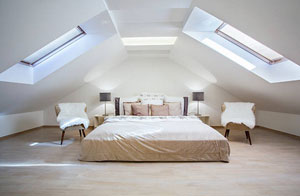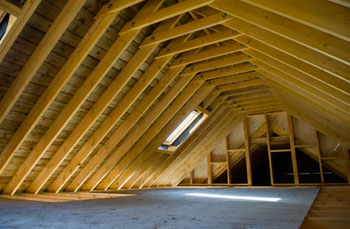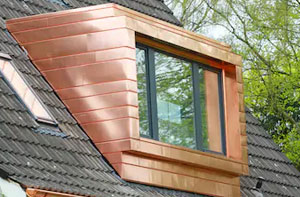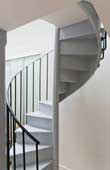Mold Loft Conversions (CH7): When you're thinking about home improvements which can both add living space and value to your home in Mold, a loft conversion should undoubtedly be an alternative to look into. This is sometimes regarded as one of the better ways to add value to your property. Because loft conversions rarely need planning permission, the attractiveness of this option becomes even more recognizable.
When budgeting for a loft conversion in Mold, you'll find there are three or four variables to be considered so as to work out the costs. Such factors might include, the intended use of the room created, the conversion design you are putting in, the type and amount of skylights or windows to be used and the size and layout of your house. The majority of loft conversion contractors in Mold offer free quotations for conversions, so you should take full advantage of this service and get several quotes. The UK typical cost of a loft conversion at the moment (2020) is thought to be somewhere between thirty and forty thousand pounds.

Even though there are plenty of possible uses to which you can put the additional room attained by a loft conversion, you will in all probability already have an idea as to what your exact needs are. Maybe you are in desperate need of an additional bedroom or two to accommodate your growing family, perhaps you would like to build a playroom where your children can have their own quality space, or it might be that you are wanting to create an office where you'll be able to work in a relaxed and calm environment. Whatever applies to you, a loft conversion is certainly an effective means by which to deliver that extra space.
Because the value of your property in Mold is going to increase when the loft conversion is completed, you'll need to analyze by how much. You need to grasp the fact that most neighbourhoods of Mold will have a threshold price for houses. Boosting the value of your home beyond this ceiling price can make it difficult to sell when you need to. Loft conversions can be a poor investment in these scenarios. Even for folks that aren't considering selling up, this is worth bearing in mind.
An alternative known as a shell loft conversion is an option that you could maybe look at if you're reasonable at DIY and fancy an exacting project. This is an option where the conversion specialist will undertake all of the key structural tasks (often called a first-fix loft conversion), such as steel beams, roof alterations, external windows and doors, dormers/mansard, staircase and joists. The internal jobs are left for the householder (that is to say you), allowing you to use your own skills to finish what's left as you please.

Kinds of Loft Conversion: The main kinds of loft conversion that you will encounter in Mold are: loft pods, dormer loft conversions, velux loft conversions, hip-to-gable loft conversions, roof lift loft conversions, mansard loft conversions and roof light conversions.
One of the reasons why loft conversions are so popular in Mold, is that the majority of the structural work can be accomplished externally. Disruption on the inside of your home, should therefore, be minimal. It should be relatively simple to keep the interior of your home free of mess and dust and so go on living normally.
When planning a loft conversion in Mold, it is important to consider the architectural style of your property. Mold's architectural designs are a testament to its long and varied history, with historic cottages and modern houses reflecting different eras and styles. A local builder experienced in handling different architectural styles is vital for a loft conversion that seamlessly integrates with the existing structure and improves your home's overall appearance. They can help you design a space that complements the unique character of your property, offering valuable insights and suggestions. Finally, it is important to remember that preserving the charm and heritage of local communities is of utmost importance, so be sure to check for any local conservation guidelines or building regulations that may affect your loft conversion project before proceeding.
The Benefits of a Loft Conversion
In Mold, property owners stand to gain numerous practical and personal benefits from undertaking loft conversions:
- Cost-effective alternative: In the pursuit of additional space, choosing a loft conversion instead of relocating to a larger property can offer a cost-efficient solution, with potential for considerable savings in the future.
- Increased living space: A converted loft's ability to offer additional living areas, bathrooms, bedrooms, or bespoke workspaces stands out as its most noteworthy benefit.
- Improved energy efficiency: By using existing structures and walls within your existing footprint, loft conversions can be a more energy-efficient alternative to building a regular extension.
- Enhanced property value: Converting your loft successfully can be a valuable asset for your home, markedly increasing the property's market value.
- Maximising existing space: Transforming often-underutilised space into valuable living areas, loft conversions unlock the hidden potential within your existing home.
- Enhanced Home Layout: Improving your home with a loft conversion can reconfigure its configuration and improve its overall flow. This transformation, which may include adding bathrooms or relocating bedrooms to the loft space, eases the load on other areas of the home, thus better suiting it for today's living requirements.
- Increased flexibility: Adapting to your evolving needs, a converted loft allows for the flexibility needed by growing families, the accommodation of guests, or the creation of specialised spaces for work or hobbies.
In brief, the conversion of a loft is a versatile way to deal with space limitations and improve the way you experience your property in Mold. Practical benefits such as additional space and energy savings are not the only advantages this provides. It also offers financial advantages by increasing your property value and, potentially, providing extra rental income. House owners in Mold who are looking to enhance their living environment will find this an appealing option.
Loft conversions are available in Mold and also in: Cadole, Sychdyn, Llanferres, Maeshafn, Pantymeyn, Nercwys, New Brighton, Prenbrigog, Mynydd Isa, Bryn-y-Baal, Leeswood, Treuddyn, Gwernymynydd, Cilcain, and in these postcodes CH7 1FT, CH7 1GS, CH7 1HS, CH7 1PJ, CH7 1LN, CH7 1EZ, CH7 1LU, CH7 1AF, CH7 1BG, and CH7 1BY. Locally based Mold loft conversion specialists will most likely have the postcode CH7 and the telephone code 01352. Verifying this can confirm that you access locally based providers of loft conversion. Mold householders will be able to utilise these and numerous other similar services. Click the "Quote" banner to get quotes for loft conversion.
Loft Buds
If optimising your space is on your mind, loft buds might just be the innovative solution you need! These compact additions to your loft are designed to create extra living or storage space, all without the complications of a full loft conversion. Whether it's a small office you're after, a comfy reading corner, or simply a place to put your belongings, loft buds are a cost-effective and practical choice that can really change an otherwise neglected area of your Mold home.
The simplicity of loft buds is what makes them so appealing. They let you use your loft area without the need for extensive structural work that a traditional loft conversion might require. With the addition of a skylight or a simple staircase for easy access, you can quickly transform your loft into a functional space. Loft buds are especially attractive for homes with limited headroom, as they are designed to fit within the existing structure of your property. They offer a smart way to expand your usable space without major disruption or high costs.
For those householders aiming to fully utilise their loft spaces, loft buds present a great option. They bring practicality to your home and significantly improve its aesthetic appeal and value. By getting professional advice and planning carefully, you can create a loft bud that caters to your unique style and needs. It's an inventive, budget-friendly way to explore the possibilities of your loft, while keeping your Mold home feeling open and functional. (Tags: Loft Buds Mold).
Loft Conversion Architects
A loft conversion is a fantastic way to transform unused space into something both stylish and functional, but having an experienced architect involved can elevate the project. Whether you're creating an extra bedroom, a home office, or a living space, loft conversion specialists know how to maximise the potential of homes in Mold. With a practical yet creative approach, they design layouts that fit seamlessly with your needs. They're also skilled at addressing challenges like low ceilings or awkward corners, ensuring a flawless final result.

One of the key advantages of hiring an architect for your loft conversion is definitely their capability to manage all the technical aspects. They're responsible for everything from drafting detailed plans to obtaining planning permission and making certain the design complies with building regulations. Their expertise in structural requirements, combined with creative solutions, guarantees that your conversion is not only safe and efficient but also beautifully designed. Whether it's adding skylights to let in more natural light or devising ingenious storage options, architects really know how to turn your ideas into reality while sticking to your budget.
When it comes to loft conversions, an architect brings value by personalising the design according to your specific needs. They'll think about how the new area interacts with the rest of your home, helping create a harmonious look and atmosphere. By hiring an experienced architect, you're not only upgrading your living area but also increasing the total value of your property. A loft conversion can be an exciting undertaking for your home improvement in Mold, and with the right architect at your side, it could be a wonderfully seamless experience. (Loft Conversion Architects Mold).
Mansard Loft Conversions
The maximisation of living space is a common goal among property owners who often choose mansard loft conversions. A flat roof with a steeper angle on one side is created by altering the sloping side of a roof in this sort of loft conversion. The maximisation of available headroom makes this design a great choice for loft spaces with low ceilings.
Extending the walls at a steep angle in mansard loft conversions optimises the usable floor area, providing an additional plus point. An additional bathroom or bedroom is often added due to the substantial increase in living space provided by this sort of loft conversion. Property owners seeking to increase the value of their house often select mansard loft conversions, which can add considerable value to a home.
The flexibility of design with mansard loft conversions offers householders the ability to customise the space to meet their specific needs, whether it's a playroom for children or a home office. Compared to other sorts of loft conversions, a mansard conversion may require planning permission due to the significant structural alterations involved. For homes with restrictions on roof alterations or situated in conservation areas, mansard loft conversions may be the ideal choice due to their more subdued exterior in comparison to other types of loft conversions. Mansard loft conversions' suitability can be assessed by a specialist loft conversion company, who can also oversee the entire process from the planning stage through to completion. (Tags: Mansard Loft Conversions Mold)
Dormer Windows Mold
In Mold, dormer windows are celebrated for their architectural charm, boosting both the usability and appearance of homes. These windows extend vertically from an inclined roof, adding space and allowing more natural light into the attic or loft. Homeowners in Mold choose dormer windows to make top floors more functional and attractive.

In Mold, the installation of dormer windows in many older homes with steeply pitched roofs yields significant advantages. This alteration not only boosts headroom but also adds distinctive charm to the exterior. The extra light and ventilation provided by dormer windows make attics and lofts more comfortable, transforming these underutilised spaces into bedrooms, studies, or playrooms.
Looking to add some extra space and charm to your Mold home? Dormer windows might be the answer. Local builders are adept at installing them, ensuring a perfect match with your existing roof structure. Careful planning is key, with the style of your home and local building regulations taken into account. It's no surprise then that dormer windows remain a popular choice for Mold property owners seeking to improve their property's functionality and visual appeal. (Dormer Windows Mold)
Planning Permission

Even though there are a few conditions linked to this sort of venture, planning permission is not normally necessary for loft conversions. Planning permission will be necessary if the roof space needs to be remodeled and the end result exceeds certain specific limits. Planning permission won't be required so long as the following conditions are fulfilled: obscured glazing is essential for side-facing windows, when observed from the highway no roof extension must exceed the plane of the pre-existing roof slope, pre-existing exterior walls should not be overhung by roof extensions, materials utilised in conversion need to match existing ones, the uppermost section of the roof must not be exceeded by an extension, raised platforms, balconies and verandas are not permitted, no more than 40 cubic metres added space for terraced houses and 50 cubic metres for detached/semi-detached properties. Those stipulations apply exclusively to houses and not maisonettes, flats, converted houses or any other buildings. For property owners that reside in specified areas there might be different rules where special planning conditions apply and development is restricted. So check with your local authority planning office to ascertain which regulations apply to you.
Building Regulations and Loft Conversions

Even if you don't need planning permission for your loft conversion, the relevant building regulations will still have to be adhered to. This is to make certain that the resulting conversion is structurally sound and that it satisfies the minimum requirements for energy efficiency, accessibility and safety, as laid down by building control. Which building regulations apply in your case will depend upon the sort of loft conversion you are planning on having. There are many factors to be taken into consideration and just a few of the elements that might be subject to building regs include: doors, sound insulation, walls, loft stairs, floor joists, electrics, fire safety, windows and drainage. Your local building control office will give you advice about just which building regulations apply to you, or you can chat with your builder or architect for the low down on what is necessary.... READ MORE.
Hip to Gable Loft Conversions
If you have a hipped roof, a hip to gable loft conversion might just be what you need to create extra space in your home. These roofs have a slope on each side, which can make it tough to utilise all of your loft area. A hip to gable conversion works by extending one or more of the sloped sides, or "hips," into a straight vertical wall - that's your "gable." Thanks to this adjustment, you'll gain more headroom and floor space, allowing you to transform an underutilised loft into a generous and usable room.
This type of conversion is particularly favoured by owners of semi-detached and detached homes, as adding that extra room can significantly improve layout possibilities. In Mold, numerous homeowners have turned the space into an extra bedroom, a comfortable home office, or even a snug living area. Aside from providing more space, a hip to gable conversion can also boost the value of the property, making it a wise investment if you're aiming to improve both your living area and the overall worth of your home.
Planning permission may or may not be required, depending on your location and specific property, but a good architect or builder will help you navigate any planning requirements. With careful planning and the right team, a hip to gable loft conversion can truly transform your home in Mold, providing you with a stylish, spacious new area that meets your needs. (Tags: Hip to Gable Loft Conversions Mold)
Loft Stairs Mold

Loft stairs are a crucial component of any loft conversion in Mold, offering secure and effortless access to the newly transformed living area. Selecting the appropriate loft stairs involves evaluating several aspects, including the overall visual appearance of the dwelling, the intended use of the loft and the amount of space that will be created. Loft stairs come in different types, including space-saving options such as spiral staircases and straight-flight loft stairs that can be customised to fit any design theme. The installation of loft stairs demands careful forethought and the involvement of a professional to ensure adherence to safety regulations and building codes. Engaging a professional contractor is necessary to evaluate the area, advise on the most appropriate type of stairs for the project, and guarantee that the installation meets the highest possible standards. The proper installation of loft stairs is critical in converting a loft into a beautiful and functional space that adds value to the property.
There are various types of loft stairs, and each type has its distinctive advantages and features. The following are some of the most frequently used sorts of loft stairs:
- Alternating tread stairs: These stairs feature alternating treads that permit a steeper angle, making them a great choice for extremely small spaces. However, they can be more difficult to climb than conventional stairs.
- Space-saving stairs: These stairs are intended to take up as little room as possible and often feature narrow steps or alternating treads. They are a good option for limited or unconventional areas.
- Ladder stairs: These stairs are similar to a ladder and are a good option for spaces where there is limited headroom. They are typically made from wood or metal and can be folded away when not in use.
- Spiral stairs: These stairs are a great space-saving option, taking up less room than straight stairs. They are available in various styles, such as traditional and modern, and can be constructed from different materials.
- Modular stairs: These stairs are constructed from pre-built modules that can be assembled on-site. They are easy to install and can be tailored to fit any space.
- Straight flight stairs: The most frequent type of loft stairs is straight flight stairs, which consist of a straight staircase leading up to the loft area. These stairs can be made from different materials, including metal, wood or glass.
Loft Conversion Quotes
Obtaining comprehensive and precise quotes for your loft conversion plays a key role in project planning. Take the first step by researching loft conversion specialists with a solid reputation in Mold and obtaining detailed quotes from a number of providers. Make certain that the quotations encompass all relevant elements, such as design, permissions, labour, materials, and any supplementary services you might need. To ensure a precise quote, it is advisable to have the companies visit your property for a thorough assessment beforehand. Give yourself the opportunity to meticulously compare and review the quotations, taking into consideration the pricing, quality, and trustworthiness of each contractor. Once you have gathered the quotations and thoroughly examined the options, don't hesitate to ask for references or view previous loft conversion projects completed by the companies, since this can provide a clearer picture of their standard of workmanship and customer satisfaction. It's important to bear in mind that by investing in a reputable and reliable loft conversion specialist, you can secure a successful and gratifying final result. (25725 - Loft Conversion Quotes Mold)
Loft Conversion Enquiries

The latest loft conversion requirements: Olivia Harper was struggling to find a builder or loft conversion specialist in Gwernymynydd to give an estimate for a loft conversion. Kaitlyn Lewis in Mynydd Isa needs to find somebody to do a garage conversion. Jennifer Gordon was looking for a loft conversion specialist near Sychdyn. Ms Melissa Graham in Pantymeyn wants to hire someone to convert her garage. Aaron Butler from Prenbrigog needs somebody to give a quote for a loft conversion on his 3 bedroom house. Laura Walsh from Leeswood asked "is there anyone doing loft conversion near me?". Ms Jessica Johnson in Mynydd Isa wants to hire someone to convert her garage. Daniel Lee in Leeswood needs somebody to supply a price for a conversion in his house near Leeswood. Cameron Marshall from Cadole was searching for a loft conversion company in the Cadole area. Mr and Mrs Ward need a builder or loft conversion company in were hoping to get a Velux loft conversion carried out on their house just outside Treuddyn. Mr and Mrs Walsh need a builder or loft conversion company in were hoping to get a Velux loft conversion carried out on their house just outside Maeshafn. Steven Roberts was enquiring about the cost of a loft conversion in Cilcain. Kelsey Anderson asked about a loft conversion specialist or builder to supply a quote for a conversion in Cadole. Most of these local homeowners conducted a search for "loft conversion near me" and located this website on Yahoo, Bing or Google.
Mold Loft Conversion Tasks

Mold loft conversion specialists can usually help with attic conversions, dormer loft conversion in Mold, loft makeovers, part loft conversion, loft refurbishment, loft plumbing, loft conversion price quotes, stairs for loft conversions, house extensions, building control approval, loft conversion soundproofing, loft conversion design in Mold, bespoke loft conversion Mold, loft electrics, shell loft conversions, bungalow loft conversions, loft conversion windows, loft stairs, loft transformations, bespoke loft storage, free loft surveys in Mold, bespoke loft furnishings, property extensions, loft alterations, mansion block loft conversion, garage extensions, cellar conversions, loft clearances, loft pods, hip-to-gable loft conversion and other loft related work in Mold. These are just a small portion of the duties that are undertaken by those specialising in loft conversion. Mold companies will keep you informed about their entire range of services.
Loft Conversions Near Mold
Also find: Llanferres loft conversion, Cilcain loft conversion, Bryn-y-Baal loft conversion, Sychdyn loft conversion, Maeshafn loft conversion, Cadole loft conversion, Nercwys loft conversion, New Brighton loft conversion, Leeswood loft conversion, Pantymeyn loft conversion, Gwernymynydd loft conversion, Prenbrigog loft conversion, Treuddyn loft conversion, Mynydd Isa loft conversion and more. Loft conversion services are available in practically all of these towns and areas. Turning your underused attic space into a stylish and functional living area is a task these professionals are highly skilled and equipped for. Maximizing the potential of your home can be achieved through a cost-effective loft conversion, whether you are contemplating a playroom, a home office or an extra bedroom. Local residents can get loft conversion quotations by going here. So, there is no reason not to get cracking on your loft conversion project straight away!
More: Loft Conversion Contractors, Loft Remodelling, Loft Conversion Firms, Loft Pods, Roof Light Conversions, Loft Conversion Firms, Cheap Loft Conversions, Velux Loft Conversions, Roof Lift Conversions, Home Extensions, Loft Extensions, Loft Specialists, Loft Pods, Loft Extension, Loft Solutions, Loft Remodelling, Mansard Loft Conversions, Home Extensions, Loft Conversion Firms, Loft Extension, Roof Light Conversions, Loft Conversion Experts, Cheap Loft Conversion, Loft Conversion Firms, Loft Solutions, Velux Loft Conversions, Loft Conversion, Loft Conversion Specialists, Dormer Loft Conversions, Loft Solutions, Loft Conversion Firms, Loft Extension, Home Extensions, Loft Conversion Specialists, Cheap Loft Conversion.
TOP - Loft Conversions in Mold
Loft Remodelling Mold - Cheap Loft Conversions Mold - Loft Conversion Prices Mold - Loft Conversion Cost Mold - Loft Conversion Mold - Loft Conversion Ideas Mold - Loft Insulation Mold - Loft Alterations Mold - Loft Conversion Near Me


